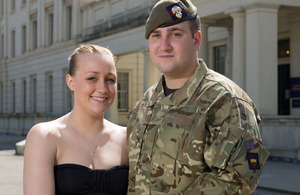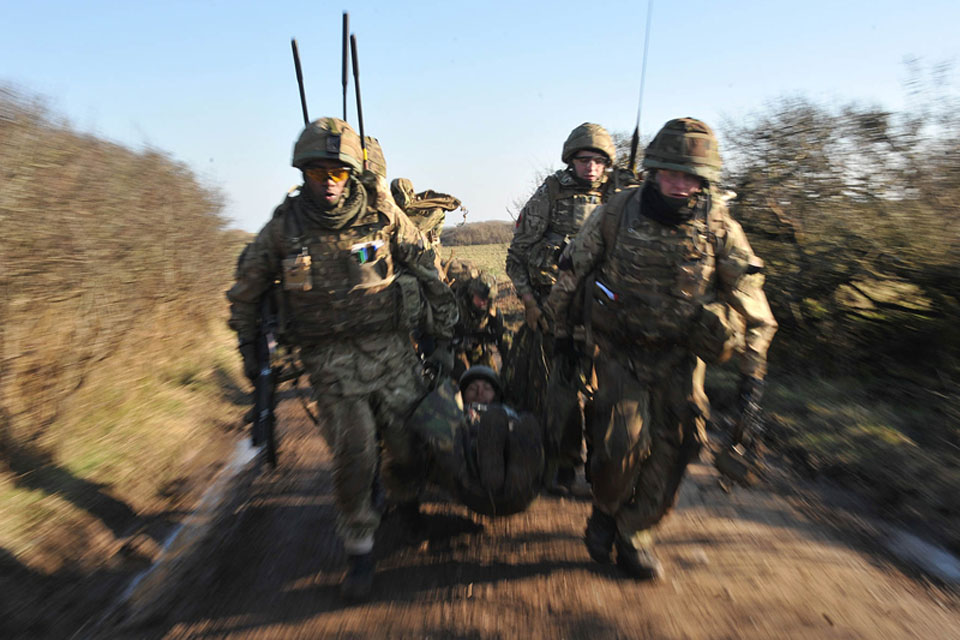Living through the guilt of surviving
When an improvised explosive device killed one of his comrades and wounded two others, Guardsman Jordan Pearson thought his own physical injuries would be his only lasting problem.

Guardsman Jordan Pearson with his wife, Loren [Picture: Crown Copyright/MOD 2012]
A rifle muzzle protruded from his chest, piercing just millimetres above the main artery going into his heart, his radio had gone through his arm, and the explosion had fired shrapnel, gravel and metal the length of his back to the soles of his feet.
His legs burned from the fierce heat of the metal fragments piercing his skin, his trousers were all but gone - shredded in the blast.
Despite his own injuries, he tried to help carry the other wounded from the ensuing fire fight, instinctively pulling the rifle muzzle from his chest.
Three years on and Guardsman Pearson’s body remains scarred, with shrapnel still coming out of his skin every day. The hidden mental scars, however, have damaged him more than any physical injury.
‘Torturing myself’
Having had both types of injuries, physical and mental, the physical side of it was far easier to get over,” said the 21-year-old Grenadier Guard.
The mental side of it, well it’s just taking so long to get over. You finally think you are there and then one little thing happens and it all comes back down again.

British soldiers carrying a simulated casualty during an exercise in Wales (stock image) [Picture: Corporal Paul Morrison, Crown Copyright/MOD 2012]
The hardest thing to deal with has been the reaction of people he had considered friends - their ignorance of post-traumatic stress disorder leading them to think he was faking flashbacks, nightmares and crippling insomnia to get out of soldiering:
The things people have said about me since admitting my post-traumatic stress are, to be fair, what I would have thought about anyone else too… before it happened to me,” he said.
Everyone says just man up, and that’s what I had been doing for so long, but it came to a point where I couldn’t man up any more. I had to go get help to get through it because it was only going to get worse, not better.
I was short-tempered and angry, drinking too much and arguing, and I was having difficulty sleeping. I was getting paranoid about sleeping in the same room as the other blokes in case they took the mick out of me for screaming in the night from the nightmares.
I was torturing myself with ‘what ifs’, and if that had happened what would have come out of it. But I still thought there was nothing wrong with me, that it was everyone else and they just hadn’t adapted to me coming back.
My now wife, Loren, begged me to realise what I was doing, and how hard I was making other people’s lives with my arguing. It would be over the stupidest little things. But I thought it was everyone else.
Talk through the explosion
The turning point came when Guardsman Pearson reacted badly to a joke made at a family wedding, and Loren’s father took him outside for a little chat, warning him that if he continued he would lose Loren and destroy everything he had:
I went to the med centre as soon as I got back to work,” he said. “I didn’t want to hurt anyone, and I was starting to worry about how much of a hold I had over myself during the flashbacks and the drinking. I didn’t know what I was doing.
Soon after reporting to the medical centre, Guardsman Pearson was referred to the Department of Community Mental Health in Woolwich for assessment and then psychotherapy, and was encouraged to talk through the explosion in Nad ‘Ali - breaking it down into little bits to look at each action from different angles.
By doing this he could slowly see that he had done nothing wrong, and that nothing he could have done would have saved his friend:
When I first went to the sessions my intention was just to forget everything, I didn’t want to relive it,” he said. “I wanted everything out of my mind so I could finally get a decent night’s sleep.
We tried things like the breathing techniques to deal with my anger, but it just didn’t work with me - it’s easier said than done to sit there and think of a happy place when all you want to do is be angry.
But breaking things down and looking at it from different ways did make me feel better as I could see I did what any normal soldier would have done in the situation.
More good days than bad days
It takes a lot of time. There is no quick fix. It’s been nearly two years for me now, and it’s a constant cycle of good and bad days. It feels like you are stuck and you can’t go that little bit further.
Initially though it was like a roundabout - sometimes I would go to the therapist and there would be absolutely nothing wrong and it would all be fine, and then a week later I would go back and there would be loads I needed to talk about.
“Now the memories only tend to come back on days like Remembrance Sunday, whereas before it was every night and I would remember that little bit more than I did the night before - so it would play on my mind.
I still have my good days and my bad days, but now it’s more good days than bad days. And when my mood swings Loren will tell me to stop me going into them so much. She knows the signs when I am starting to go downhill.
The biggest thing for me is being back at work though - it keeps you busy and your mind off other things. I just hope others will be able to make the most of my experiences to go and seek help, and this campaign [Don’t Bottle It Up] will change the way people think about mental health.
Last updated 14 December 2012 + show all updates
-
Added pics
-
This news article was converted to a news story